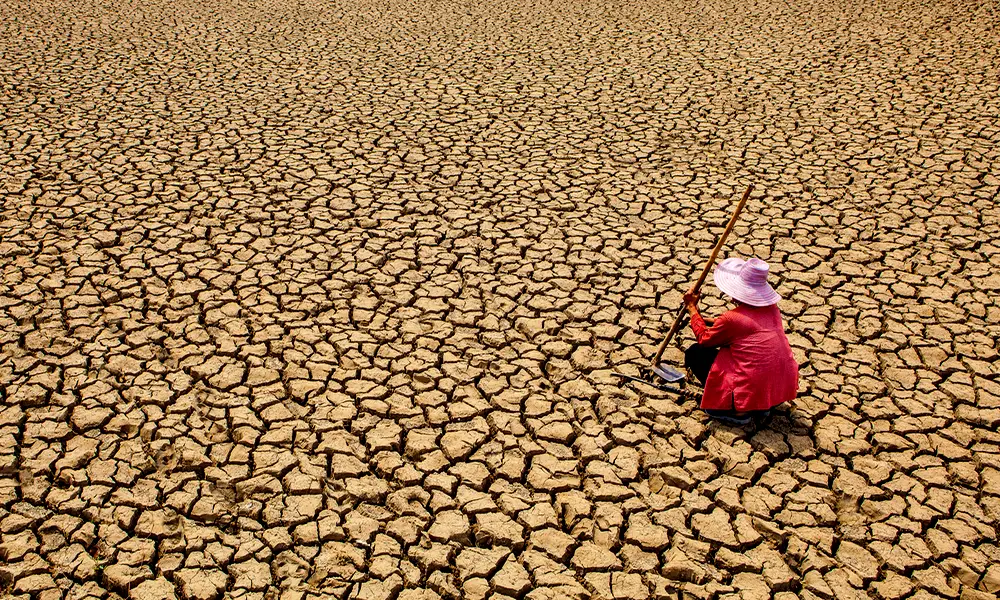News
Report: Water Scarcity Will Make Life Miserable for Nearly 6 Billion People by 2050

Rapidly dwindling supplies, increased demand, industrial agriculture, changing climate, contamination, and an exponential world population explosion comprise just a few of the multitudinous factors that — without drastic changes focused on natural solutions — will find nearly six billion people in the grips of a punishing water shortage by 2050.
Running out of potable water may smack of dystopia, but will be Earth’s reality — thanks in majority part to humanity’s dismal record of working against, rather than in tandem with, nature — within a mere three decades, according to the 2018 World Water Development Report from the United Nations.
To wit, that harrowing prospect has cruelly teased residents of Cape Town, South Africa, on multiple occasions, with a tentative date for Zero Day — a term employed to describe the day fresh drinking water slows to a trickle, and will thus be rationed and guarded by military forces — recently pushed back from July 9 this year to an as-yet assessed date in 2019, after unexpected rainfall minimally squelch persistent drought conditions.
At present, Cape Town’s residents may use no more than 13.2 gallons of water per day, each — or, “roughly enough for a brief shower and three toilet flushes,” observed the Wall Street Journal earlier this month — painting a frightening portent for the moment so-called Zero Day actually arrives.
Despite a steady and relatively stable 1 percent annual increase in global demand for fresh water, the planet’s more than 7.6 billion inhabitants and counting have strained supplies beyond sustainable levels, says the U.N. And while large-scale agriculture remains the biggest offender, consumer and industrial demand is projected to outpace it in the coming decades — unless a concerted effort employing a plethora of “nature-based solutions,” or NBS, is undertaken in earnest. Now.
“The stakes are high,” emphasized Audrey Azoulay, Director-General of UNESCO, which commissioned the report, reports MarketWatch. “Current trends suggest that around two-thirds of forests and wetlands have been lost or degraded since the beginning of the 20th century. Soil is eroding and deteriorating in quality. Since the 1990s, water pollution has worsened in almost all rivers in Africa, Asia and Latin America.”
Without firm understanding of the consequences, humans undertook damming rivers, draining wetlands, dumping toxins, and other methods in failed attempts to manage the world’s water — perhaps arrogantly dismissing traditional techniques which work with or mimic nature.
Chair of U.N.-Water Gilbert Houngbo explains this folly in the report’s introduction, stating,
“For too long, the world has turned first to human-built, or ‘grey’, infrastructure to improve water management. In doing so, it has often brushed aside traditional and indigenous knowledge that embraces greener approaches. In the face of accelerated consumption, increasing environmental degradation and the multi-faceted impacts of climate change, we clearly need new ways of manage competing demands on our freshwater resources.”
All dreariness aside, the one-hundred-page report proposes general and specific measures to putatively avert or delay a likely tidal wave of Zero Days around the globe in the coming years, pun intended.
“There are different kinds of NBS, that range from the personal — a dry toilet — to applications that include conservation agriculture to minimize soil disturbance, maintain soil cover and regularize crop rotation,” MarketWatch notes of the report. “There are also NBS that could be used in urban areas, including green buildings, green walls, roof gardens and vegetated infiltration or drainage systems, landscape restoration, or even systems that improve the performance of built infrastructure.”
With global demand having increased sixfold in a single century, battles against corporate bottlers, the oil and gas industry, commercial agriculture, polluters, and other large-quantity consumers have accordingly intensified in the interest of protecting what’s left.
Prior to the revision of its predicted date of arrival, Zero Day elicited remarkable apathy from many residents of Cape Town — so much so, commentators and officials wondered if the concept of a massive and enduring water shortage was perhaps too much to bear, or if the convenience of water from the tap might be so taken for granted as to make its loss seem literally unimaginable.
If the U.N. report’s frightening prediction comes to fruition, however, cities across the planet — billions of people worldwide — will face similarly dreadful water scarcity in the near future, unless a global transformation of humanity’s relationship with water fast shifts into overdrive.
Azoulay, of UNESCO, duly if measuredly noted, “water scarcity can lead to civil unrest, mass migration, and even to conflict within and between countries.”
Wars over water — rather than fossil fuels — bleakly await, should nature-based or other proposed methods fail to mitigate the damage wrought by lifetimes of human-centric myopathy toward that invaluable resource. Azoulay added,
“This is a major task all of us need to accomplish together responsibly so as to avoid water-related conflicts.”
Image: ShutterStock/Wiratchai wansamngam.
Typos, corrections and/or news tips? Email us at Contact@TheMindUnleashed.com
